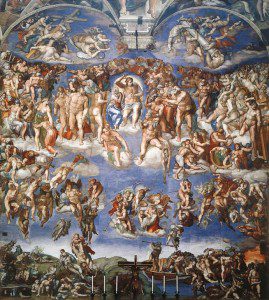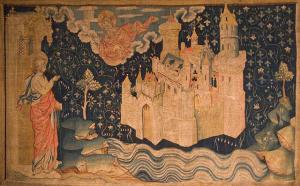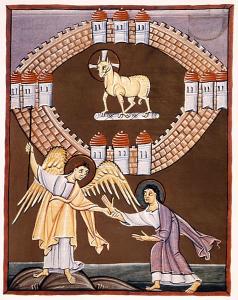I believe in …
the resurrection of the body,
and the life everlasting.
 The Apostles’ Creed ends on a note of hope, bringing the brief synopsis of the biblical story to a close. Christian hope culminates in the age to come, when the heavens and earth are restored and we live in resurrection bodies – immortal, not subject to decay. The reality of resurrection and life everlasting is more than personal salvation. It is victory over death. It is assurance that everything will be set right. To be true to God and resist the tyranny of evil may bring suffering in this world. The early church was well aware of this reality. One only need to look to the fate of many of the apostles and the Roman persecution of the church for confirmation. But resistance isn’t futile and fatalism has no place in the Christian outlook. There will be justice including judgment, mercy, and reward. The ultimate victory is won.
The Apostles’ Creed ends on a note of hope, bringing the brief synopsis of the biblical story to a close. Christian hope culminates in the age to come, when the heavens and earth are restored and we live in resurrection bodies – immortal, not subject to decay. The reality of resurrection and life everlasting is more than personal salvation. It is victory over death. It is assurance that everything will be set right. To be true to God and resist the tyranny of evil may bring suffering in this world. The early church was well aware of this reality. One only need to look to the fate of many of the apostles and the Roman persecution of the church for confirmation. But resistance isn’t futile and fatalism has no place in the Christian outlook. There will be justice including judgment, mercy, and reward. The ultimate victory is won.
The resurrection of the body. As Michael Bird (What Christians ought to Believe) puts it “Christians do not believe in the immortality of the soul, but in the resurrection of the body. … We need to bring our congregations back to the language of resurrection and new creation to underscore the embodied and physical nature of our future hope.” (p. 216) Paul’s first letter to the Corinthians digs into the resurrection. and nature of resurrection bodies. A few highlights:
But if it is preached that Christ has been raised from the dead, how can some of you say that there is no resurrection of the dead? … If only for this life we have hope in Christ, we are of all people most to be pitied. 1 Cor. 15:12, 19
But someone will ask, “How are the dead raised? With what kind of body will they come?” … When the perishable has been clothed with the imperishable, and the mortal with immortality, then the saying that is written will come true: “Death has been swallowed up in victory. “Where, O death, is your victory? Where, O death, is your sting?” The sting of death is sin, and the power of sin is the law. But thanks be to God! He gives us the victory through our Lord Jesus Christ. Therefore, my dear brothers and sisters, stand firm. Let nothing move you. Always give yourselves fully to the work of the Lord, because you know that your labor in the Lord is not in vain. 15: 35, 53-58.
J.I. Packer (Affirming the Apostles’ Creed) notes the importance of bodily resurrection: Our bodies are not extra, but an integral part of who and what we are. Our bodies allow us to act and react. “The raising of the body means the restoring of the person – not just part of me but all of me – to active, creative, undying life, for God and with God.” (p. 138) The resurrection body will be healed and changed, but it will be a body. Our hope is not for immortality of the soul in some disembodied existence, mind without matter, but for a new and healed existence as persons.
 The life everlasting. Packer asks “What will we do in heaven? Not lounge around, but worship, work, think and communicate, enjoying activity, beauty, people, and God.” (p. 146) The life everlasting, or better, eternal life in the age to come, will not be a boring sameness of harps and clouds. There will be a city and activity. Revelation 21 gives an image.
The life everlasting. Packer asks “What will we do in heaven? Not lounge around, but worship, work, think and communicate, enjoying activity, beauty, people, and God.” (p. 146) The life everlasting, or better, eternal life in the age to come, will not be a boring sameness of harps and clouds. There will be a city and activity. Revelation 21 gives an image.
Then I saw “a new heaven and a new earth,” for the first heaven and the first earth had passed away, and there was no longer any sea. I saw the Holy City, the new Jerusalem, coming down out of heaven from God, prepared as a bride beautifully dressed for her husband. And I heard a loud voice from the throne saying, “Look! God’s dwelling place is now among the people, and he will dwell with them. They will be his people, and God himself will be with them and be their God. ‘He will wipe every tear from their eyes. There will be no more death’ or mourning or crying or pain, for the old order of things has passed away.” …The nations will walk by its light, and the kings of the earth will bring their splendor into it. On no day will its gates ever be shut, for there will be no night there. 21: 1-4; 24-25.
 Ben Myers (The Apostles’ Creed) turns to the Gospel of John to flesh out the idea of eternal life. “For John, “eternal life” is about quality, not quantity. It is a quality of life that believers experience already when they attach themselves to Jesus.” (p. 126) Read John 3:36, 5:24, 10:10, 11:25-26, 17:3. Eternal life is here and now as well as future. Eternal life is not only duration, it is more importantly relationship with God through Jesus. It is, with resurrection, victory over death. “Even in death our relationship to Jesus is not broken. Death becomes another place where we can go to find him.” (p. 127)
Ben Myers (The Apostles’ Creed) turns to the Gospel of John to flesh out the idea of eternal life. “For John, “eternal life” is about quality, not quantity. It is a quality of life that believers experience already when they attach themselves to Jesus.” (p. 126) Read John 3:36, 5:24, 10:10, 11:25-26, 17:3. Eternal life is here and now as well as future. Eternal life is not only duration, it is more importantly relationship with God through Jesus. It is, with resurrection, victory over death. “Even in death our relationship to Jesus is not broken. Death becomes another place where we can go to find him.” (p. 127)
Derek Vreeland (primal credo) takes a slightly different tack – but turns to 1 John 5:11-12 to come to a similar place: And this is the testimony: God has given us eternal life, and this life is in his Son. Whoever has the Son has life; whoever does not have the Son of God does not have life.
And the greatest of these is love. Love will rule. Love of God and for God and love for each other in the community of God’s people. We will be raised imperishable, clothed with immortality for God’s future, the consummation of his plan.
For I am convinced that neither death nor life, neither angels nor demons, neither the present nor the future, nor any powers, neither height nor depth, nor anything else in all creation, will be able to separate us from the love of God that is in Christ Jesus our Lord. Roman 8:38-39
If you wish to contact me directly you may do so at rjs4mail [at] att.net.
If interested you can subscribe to a full text feed of my posts at Musings on Science and Theology.














